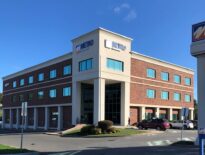
Emilio Dorcely
We all know the statistics. Boston, for all of its overall wealth, still has a staggeringly high poverty rate – nearly 20 percent of people living in the city of Boston are poor, according to the U.S. Census Bureau. That rate is not equally distributed across race and ethnicity, unfortunately. The poverty rate for Boston’s Black communities is 24 percent, according to a 2019 report prepared by The Center for Church and Prison Inc. It is 31 percent for the Latinx community. For the city’s white residents, it is only 12 percent. And the COVID-19 pandemic has only made things more challenging for already vulnerable people.
So it is discouraging for those who have spent decades trying to provide quality affordable housing and community services to long-term residents of Roxbury and Jamaica Plain to see concerns raised about Pine Street Inn’s proposed supportive housing project on Washington Street in Jamaica Plain. The development will bring 202 much-needed units of income-restricted housing to the neighborhood, 140 of which will be supportive housing. Roxbury and Jamaica Plain need both the housing and the services that Pine Street Inn and its partner, the Community Builders, will bring.
What is Supportive Housing?
“Supportive housing” is affordable housing that comes with a host of services to help provide stability and support to low-income populations. Those services can include everything from case work to substance abuse treatment, and the people served are often seniors, children, people living with disabilities, veterans and formerly homeless individuals and families – all vulnerable members of society who deserve extra support.
Neighborhoods like Jackson Square and Egleston Square benefit from supportive housing tremendously because it means more stability for those living there and helps prevent the displacement of fewer long-term residents. Rather than viewing the Pine Street Inn project – which will be the largest development of supportive housing in the city of Boston – as a threat, neighbors should embrace it as an example of stakeholders working together to find solutions to poverty and inequality, challenges that destabilize otherwise strong cities.
Both Jackson and Egleston Squares – at the intersection of Roxbury and Jamaica Plain – are predominantly Black and Brown neighborhoods. Residents here need the kind of resources that the Pine Street Inn/Community Builders project will bring.
Building Resilient Communities
As a community development corporation, Urban Edge has long understood how integral both housing and services are to building resilient communities, especially for those who have borne the brunt of discriminatory housing policies and a lack of resources in Black and Brown neighborhoods. For the past 45 years, we have produced, preserved and managed more than 1,500 units of affordable housing in the city of Boston, ensuring that thousands have a safe home. At the same time, we have provided the community the kinds of services – from first-time homebuying classes and foreclosure prevention to Volunteer Income Tax Assistance and credit counseling – that have helped our residents and our neighbors advance out of poverty.
But the reality is that the income inequality gap in Boston and beyond is widening, in part because housing has become prohibitively expensive. That is why Urban Edge has committed to producing even more affordable units – because we know that the most effective way to move people out of poverty is to build housing that is affordable and to create opportunities to build wealth. Over the past few years, we have either completed or are in the process of building 218 units of housing in Jackson and Egleston Squares.
This autumn, we will begin construction on Holtzer Park, which will bring 62 new affordable rental homes to Jackson Square. Of those units, 21 will be focused on extremely low-income individuals and families. All of them will receive the resident support services – including rental assistance, food assistance, financial coaching and more – provided by Urban Edge to all residents of its developments. As importantly, we work with residents to connect them to the community and each other, and to find leadership opportunities. Additionally, our community engagement staff includes certified financial coaches and community health workers that help residents navigate some of society’s most complicated – but important – systems.
As a long-time institution in Roxbury and Jamaica Plain, we understand that neighborhoods change. But we have the opportunity to ensure that communities change in a way that helps our most vulnerable residents, not hurt them. Supportive housing is one important tool to strengthen the city and prevent displacement in Egleston Square. We hope others will support these kinds of developments moving forward.
Emilio Dorcely is the CEO of Urban Edge.





